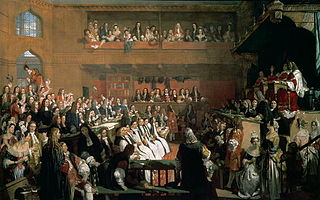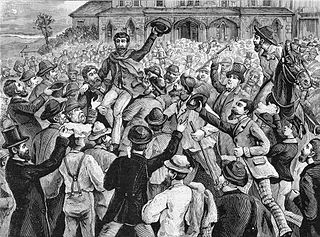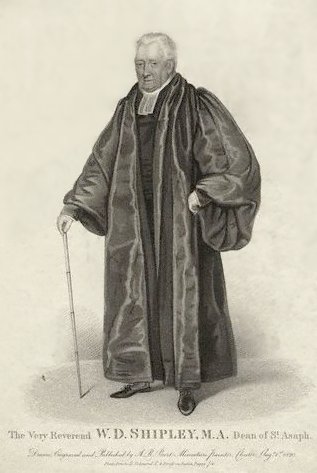
The Supreme Court of Canada is the highest court in the judicial system of Canada. It comprises nine justices, whose decisions are the ultimate application of Canadian law, and grants permission to between 40 and 75 litigants each year to appeal decisions rendered by provincial, territorial and federal appellate courts. The Supreme Court is bijural, hearing cases from two major legal traditions and bilingual, hearing cases in both official languages of Canada.

Jury nullification, also known in the United Kingdom as jury equity, or a perverse verdict, is when the jury in a criminal trial gives a verdict of not guilty even though they think a defendant has broken the law. The jury's reasons may include the belief that the law itself is unjust, that the prosecutor has misapplied the law in the defendant's case, that the punishment for breaking the law is too harsh, or general frustrations with the criminal justice system. Some juries have also refused to convict due to their own prejudices in favor of the defendant. Such verdicts are possible because a jury has an absolute right to return any verdict it chooses. Nullification is not an official part of criminal procedure, but is the logical consequence of two rules governing the systems in which it exists:
- Jurors cannot be punished for passing an incorrect verdict.
- In many jurisdictions, a defendant who is acquitted cannot be tried a second time for the same offense.

In common law jurisdictions, an acquittal means that the criminal prosecution has failed to prove that the accused is guilty beyond a reasonable doubt of the charge presented. It certifies that the accused is free from the charge of an offense, as far as criminal law is concerned. The finality of an acquittal is dependent on the jurisdiction. In some countries, such as the United States, an acquittal prohibits the retrial of the accused for the same offense, even if new evidence surfaces that further implicates the accused. The effect of an acquittal on criminal proceedings is the same whether it results from a jury verdict or results from the operation of some other rule that discharges the accused. In other countries, like Australia and the UK, the prosecuting authority may appeal an acquittal similar to how a defendant may appeal a conviction — but usually only if new and compelling evidence comes to light or the accused has interfered with or intimidated a juror or witness.
The Coffin affair was an event in Canadian history in which a man named Wilbert Coffin was hanged for the murder of three men. The affair started in June 1953 in Gaspésie when three men from Pennsylvania were reported missing. Their bodies were found a month later deep in the woods 60 km (37 mi) from the nearest town.
Beyond (a) reasonable doubt is a legal standard of proof required to validate a criminal conviction in most adversarial legal systems. It is a higher standard of proof than the standard of balance of probabilities commonly used in civil cases because the stakes are much higher in a criminal case: a person found guilty can be deprived of liberty or, in extreme cases, life, as well as suffering the collateral consequences and social stigma attached to a conviction. The prosecution is tasked with providing evidence that establishes guilt beyond a reasonable doubt in order to get a conviction; albeit prosecution may fail to complete such task, the trier-of-fact's acceptance that guilt has been proven beyond a reasonable doubt will in theory lead to conviction of the defendant. A failure for the trier-of-fact to accept that the standard of proof of guilt beyond a reasonable doubt has been met thus entitles the accused to an acquittal. This standard of proof is widely accepted in many criminal justice systems, and its origin can be traced to Blackstone's ratio, "It is better that ten guilty persons escape than that one innocent suffer."
The Court of Appeal of Quebec is the highest judicial court in Quebec, Canada. It hears cases in Quebec City and Montreal.

William Ian Corneil Binnie is a former puisne justice of the Supreme Court of Canada, serving from January 8, 1998 to October 27, 2011. Of the justices appointed to the Supreme Court in recent years, he is one of the few appointed directly from private practice. On his retirement from the Court, he was described by The Globe and Mail as "arguably the country's premier judge", by La Presse as "probably the most influential judge in Canada of the last decade" and by the Toronto Star as “one of the strongest hands on the court.”

R v Zundel [1992] 2 S.C.R. 731 is a Supreme Court of Canada decision where the Court struck down the provision in the Criminal Code that prohibited publication of false news on the basis that it violated the freedom of expression provision under section 2(b) of the Canadian Charter of Rights and Freedoms.

Morgentaler v R is a decision of the Supreme Court of Canada where physician Henry Morgentaler unsuccessfully challenged the prohibition of abortion in Canada under the federal Criminal Code. The Court found the abortion law was appropriately passed by Parliament under the laws of federalism. This was the first of three Supreme Court decisions on abortion that were brought by Morgentaler.
United States criminal procedure derives from several sources of law: the baseline protections of the United States Constitution; federal and state statutes; federal and state rules of criminal procedure ; and state and federal case law. Criminal procedures are distinct from civil procedures in the US.
The Double Jeopardy Clause of the Fifth Amendment to the United States Constitution provides: "[N]or shall any person be subject for the same offence to be twice put in jeopardy of life or limb..." The four essential protections included are prohibitions against, for the same offense:

Miazga v Kvello Estate, 2009 SCC 51 is a leading decision of the Supreme Court of Canada on how the tort of malicious prosecution applies to Crown attorneys and other public prosecutors. Specifically, the court held that there is no requirement for a public prosecutor to have a subjective belief that an accused person is actually guilty. Nor can there be a presumption of malice from a lack of reasonable and probable grounds.

The Case of the Dean of St Asaph, formally R v Shipley, was the 1784 trial of William Davies Shipley, the Dean of St Asaph, for seditious libel. In the aftermath of the American War of Independence, electoral reform had become a substantial issue, and William Pitt the Younger attempted to bring a Bill before Parliament to reform the electoral system. In its support Shipley republished a pamphlet written by his brother-in-law, Sir William Jones, which noted the defects of the existing system and argued in support of Pitt's reforms. Thomas FitzMaurice, the brother of British Prime Minister Earl of Shelburne, reacted by indicting Shipley for seditious libel, a criminal offence which acted as "the government's chief weapon against criticism", since merely publishing something that an individual judge interpreted as libel was enough for a conviction; a jury was prohibited from deciding whether the material was actually libellous. The law was widely seen as unfair, and a Society for Constitutional Information was formed to pay Shipley's legal fees. With financial backing from the society Shipley was able to secure the services of Thomas Erskine KC as his barrister.

William Davies Shipley was an Anglican priest who served as Dean of St Asaph for nearly 52 years, from 27 May 1774 until his death. In a legal cause célèbre which became known as the Case of the Dean of St Asaph, he was tried and convicted on a charge of seditious libel in August 1784, but was discharged by the Court of King's Bench a few months later without being punished.
Michael Moldaver is a former Canadian judge. He was a puisne justice on the Supreme Court of Canada from his 2011 appointment by former Prime Minister Stephen Harper until his retirement in 2022. Before his elevation to the nation's top court, he served as a judge at the Ontario Superior Court of Justice and the Court of Appeal for Ontario for over 20 years. A former criminal lawyer, Moldaver is considered an expert in both Canadian criminal law and the Canadian Charter of Rights and Freedoms.

R v Coote is a Canadian constitutional law decision in 1873 dealing with the powers of the provinces under the British North America Act, 1867. The point in issue was whether Quebec had the constitutional authority to create a mandatory inquiry power for provincial fire commissioners.
Burks v. United States, 437 U.S. 1 (1978), is a United States Supreme Court decision that clarified both the scope of the protection against double jeopardy provided by the Fifth Amendment to the United States Constitution and the limits of an appellate court's discretion to fashion a remedy under section 2106 of Title 28 to the United States Code. It established the constitutional rule that where an appellate court reverses a criminal conviction on the ground that the prosecution failed to present sufficient evidence to prove the defendant's guilt beyond a reasonable doubt, the Double Jeopardy Clause shields the defendant from a second prosecution for the same offense. Notwithstanding the power that appellate courts have under section 2106 to "remand the cause and direct the entry of such appropriate judgment, decree, or order, or require such further proceedings to be had as may be just under the circumstances," a court that reverses a conviction for insufficiency of the evidence may not allow the lower court a choice on remand between acquitting the defendant and ordering a new trial. The "only 'just' remedy" in this situation, the Court held, is to order an acquittal.
Lamb v Benoit, [1959] SCR 321 was a legal case that was heard by the Supreme Court of Canada. Louise Lamb, a Jehovah's Witness, was arrested for distributing religious pamphlets in Verdun, Quebec, in 1946, along with three other members of the religion.

R v Advance Cutting & Coring Ltd. [2001] 3 SCR 209 is a Canadian labour law case concerning compulsory trade union membership in the Quebec construction industry. The Supreme Court of Canada considered the application of section 2(d) of the Canadian Charter of Rights and Freedoms to the Quebec law in question. A divided Court affirmed the law's constitutionality.







